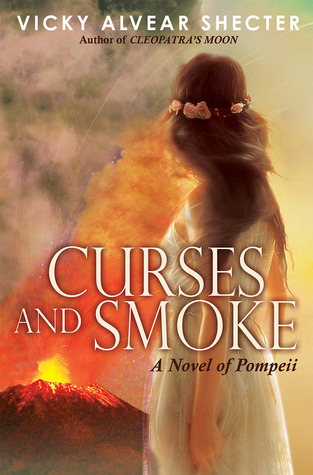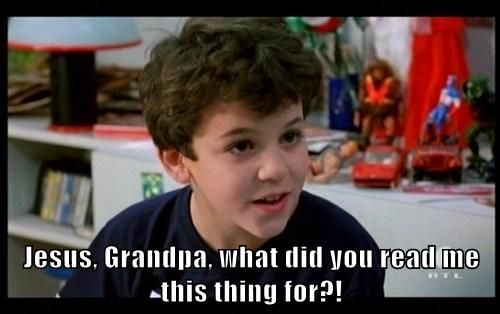 Title: Curses and Smoke: A Novel of Pompeii
Title: Curses and Smoke: A Novel of PompeiiAuthor: Vicky Alvear Shecter
Publisher: Arthur A. Levine Books
Publication Date: May 27th, 2014
Read: April 2014
Where It Came From: eARC from publisher via NetGalley*
Genre: YA-historical
Rating: 3 Foreshadowing Earthquakes
The Quick and Dirty:
Lucia is the daughter of a gladiator training school owner in Pompeii, and not looking forward to her impending arranged marriage. When her childhood friend, a slave boy named Tag, returns from Rome after training to be a healer, the two reconnect and begin dreaming of a life beyond their current confines. But then there’s all the strange things occurring around Pompeii recently—earthquakes, dead fish in the bay, poisoned springs… Lucia ponders what it could all mean while imagining a life with Tag out from under her father’s thumb, but will they be able to escape life in the shadow of Vesuvius? I didn’t find the characters particularly compelling and the writing was in the middle—not awful, but not super good. Still, it kept me turning pages and as the inevitable drew near there were some unexpected twists that (at last!) got an emotional response out of me.
The Wordy Version:
Guys. This book…I don’t even know what to say. For a book that I was feeling so solidly meh about throughout the entire reading to have that sort of effect on me at the very end… I wasn’t expecting tragedy! Which might sound dumb for a book about Pompeii, but…well, we’ll come back to that later.
Lucia is the only child of a middle-class gladiator training school owner, and she wants more from life than marriage to an old, lecherous man in Rome for her father’s gain. She’s interested in science and nature, and has been noticing strange things happening around the city of late (naturally, no one pays any attention to her when she brings them up). She’s pretty in the middle as far as characters go—she’s not objectionable, but she’s not terribly interesting either. Our other protagonist, Tag, was sent away to Rome to train as a healer for a few years to eventually follow in his father’s footsteps at the training school, but upon his return to Pompeii he dreams instead of becoming a gladiator and winning his freedom. Again, not objectionable, but not a character I felt overly attached to. I did really like his Etruscan heritage, though—the fact that he was descended from a formerly powerful family from the time the Etruscans ruled the area added a new slant and extra fire to his rage at being a slave.
So of course the two fall in love, FORBIDDEN love, and have to keep it secret from everyone around them. The daughter of a training school owner cannot love a slave, especially when she is already promised to a creepy old man! For some reason, Tag and Lucia both came across as younger than their 16 years for much of the book (at least until they start making out in the woods and Lucia debates love vs. lust with her married friend). Other characters are added to the mix—Lucia’s father, mostly portrayed as monstrous; Castor, a young slave boy who takes a shine to Tag; Quintus, a louche patrician dilettante who plays at gladiator training and develops an interest in Lucia; Lucia’s friend Cornelia, sassy and pregnant; and Cornelia’s husband, who sounds like a pretty awesome guy until we actually meet him. Cornelia is one of the more interesting characters, as she has some life and verve to her (although the fact that the word “waddle” is used to describe her every movement got a little irritating. Yes, alright, she’s hugely pregnant! We get it already!). My FAVORITE character, though, was Lucia’s dog Minos. So cute. I even wrote in my notes as I was reading that the most emotional reaction the book got out of me was when someone hit the dog. But…that was before I got to the end.
So here I am, reading along, thinking I like the book only so-so, but MAN is that dog great! I’m composing the review in my head, and then BOOM—I was hoodwinked! Throughout the book, the chapters sometimes begin with a label like “One Month Before,” or “Two Weeks Before,” clearly counting down to something. But…they were not counting down to what I thought they were counting down to. And after Vesuvius finally erupted, I was so caught up in the chaos that I didn’t even notice it was still counting down until it was too late. Well played, author! As I said, I was not expecting tragedy. At least, not that sort of tragedy. (If you plan on ever reading this book, stop reading now, because I’m going to go spoiler-happy and am too lazy to tag it.) Despite meh characters and my general lack of investment in the story, the explosion of Vesuvius and the aftermath were well-written and engrossing. I actually started getting more involved and hoped Tag and Lucia would make it out of the city and have a chance at a life together with little Castor as their adopted son. They could reunite with Minos! And never have to worry about her father again! This eruption could potentially be the best thing that ever happened to them!!!
But it wasn’t. Lucia’s death, when they were SO close to refuge in a nearby city, and NOT caused by the volcano, was surprising, and upsetting, and way more affecting than I would’ve expected. It just…things did not go down the way I expected them to. And I hadn’t even been consciously, strongly hoping for them to go a certain way! I was completely surprised that I had such a strong reaction to a book I’d been feeling eh… about throughout my entire reading. I was sobbing, and at the same time indignant that I was even crying at all. I felt kind of like that kid in The Princess Bride movie:

I felt somehow a bit cheated—how can a book be both meh AND emotionally upsetting?? You know how some books are sad, but you feel in a way fuller afterward (like, say, Code Name Verity)? This one was sad, and left me feeling hollow and empty. Which isn’t to say it was bad…I was just shocked, and upset, and shocked that I was so upset. Does the tragic ending make it a better book than it would’ve been if everything had turned out happily ever after (or at least as close as can be expected after a volcanic eruption)? Hard to say.
Beyond the mostly average characters, there were some other aspects of the writing that contributed to my overall so-so feelings about the book. Modern-sounding language disrupts the atmosphere at times (people saying “sure,” for example), and some of the slave characters have an accent or way of speaking written in that comes and goes (a huge pet peeve of mine). Additionally, though the author clearly did lots of research about Roman and Pompeiian culture and history, it unfortunately often manifests in awkward infodumps, or migrates to the other extreme and is dropped in haphazardly without explanation and without sufficient context for the reader to figure it out on their own.
There were some other plot lines woven in, like a mystery involving the death of Lucia’s mother many years prior, and her father’s and Tag’s roles in it (this is also where the titular “curses” come in). The thread involving Quintus’ interest in Lucia (but as it turns out, actually Tag) is kind of meandering and confusing, and peters out with a whimper. Cornelia’s role seemed tangential at times, but made more sense after reading the author’s note at the end. This section was actually one of my favorite parts—it was cool to see some of the actual history that inspired certain characters and events in the book. Apparently in excavations of Pompeii the remains of a very pregnant upper class woman were found. The general conclusion is that she was in too delicate a condition to evacuate the city, and thus the character of Cornelia was born. The author also describes the discovery of the remains of a dog still chained in his yard—that inspired Minos, and she decided to rewrite history by having someone release him so he could escape (which I appreciated, because that totally sounds like something I would do if I were writing a book about Pompeii).
Overall, neither astonishingly bad nor astonishingly awesome. It was quite readable (though I wasn’t super-invested), the romance was sweet (if not totally inspiring), and the ending was very sad. Not quite as good as I had hoped, but it sure packed a wallop for me in the final pages.
*As ever, much as we are grateful for the copy, our review is uninfluenced by its source.







No comments:
Post a Comment